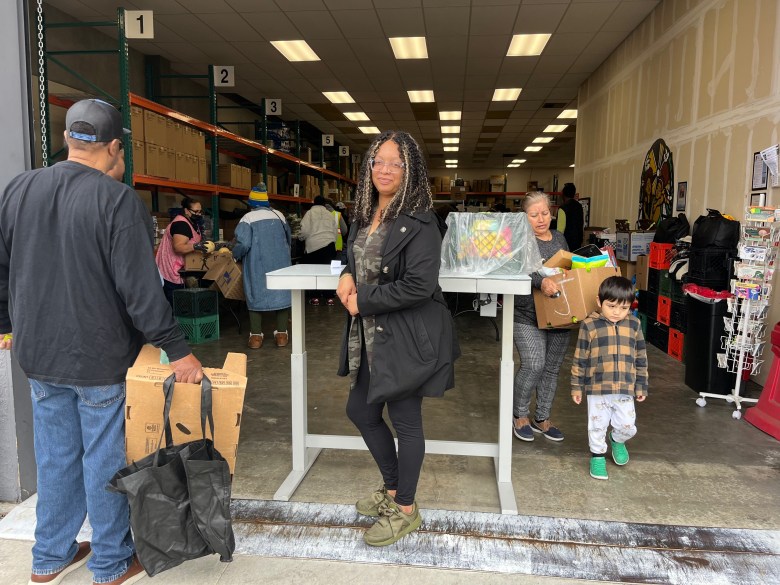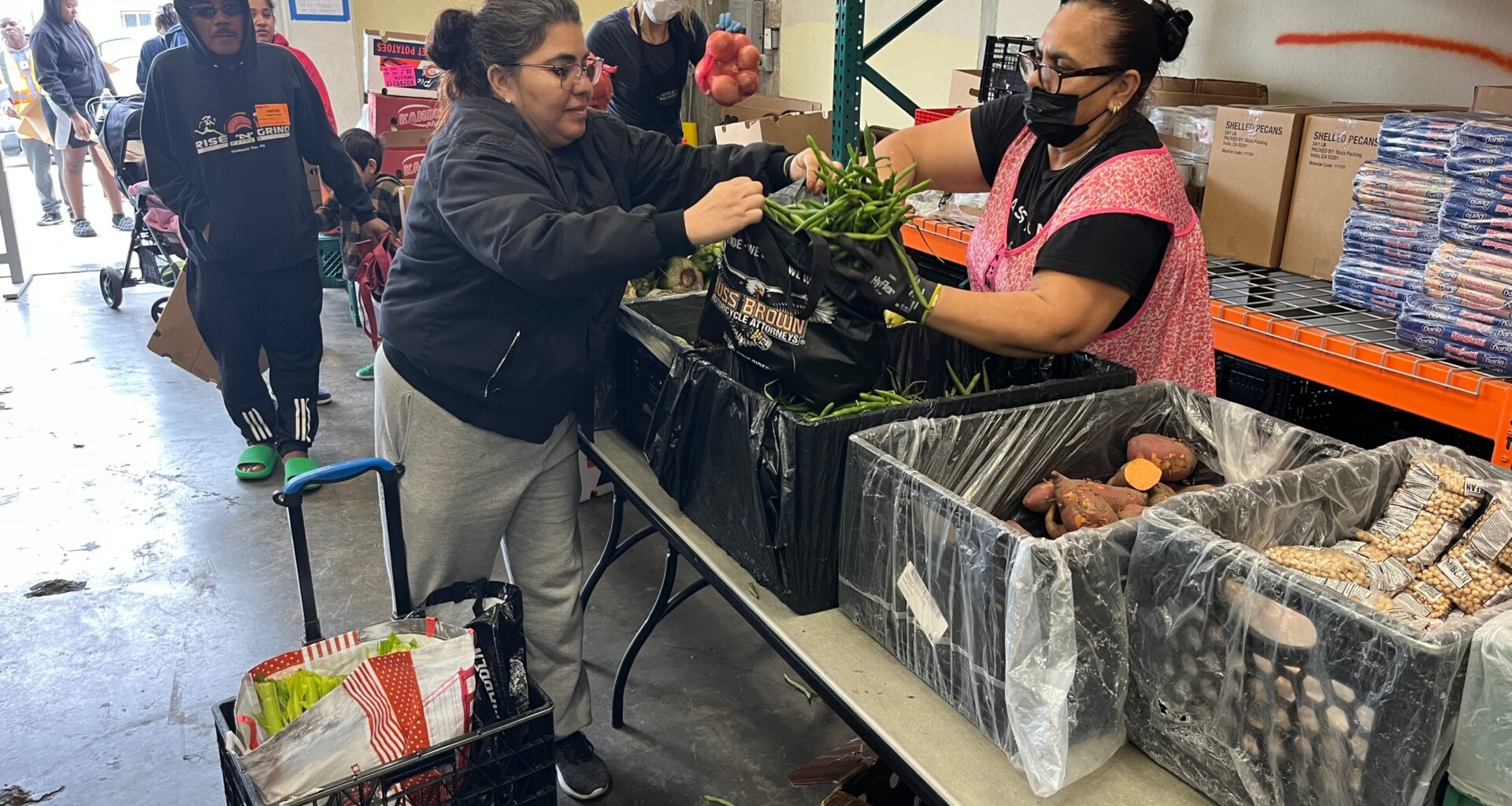Facing suspension of federal food assistance benefits next week, Bay Area nonprofit distributors are bracing for a surge in demand.
“We’re going to be back to pandemic levels,” said Candice Elder, executive director of the East Oakland Collective, a neighborhood organization that distributes free food and other services.
Grassroots programs fill a critical niche in the region’s food security system by serving the most vulnerable residents, including immigrants who might fear waiting in line at large food banks. But many community-based groups are struggling to scale up operations to meet the expected spike in need, and say their logistical capacity and supplies are maxed out.
Due to the nearly monthlong federal government shutdown, funding for the Supplemental Nutrition Assistance Program, known as SNAP or CalFresh in California, will lapse for the first time in its 60-year history on Saturday. This follows Congress’s cut of $186 billion to SNAP in July, the largest funding reduction in the program’s history.
San Francisco announced Wednesday that it would mail gift cards to recipients in the city to cover the lost benefit, but other Bay Area counties are scrambling with a patchwork of strategies. More than 5.5 million Californians receive CalFresh, and many must make contingency plans.
Josh Schneider, a case manager who also runs the kitchen at CityTeam Oakland, said he has noticed a major increase in calls about the nonprofit group’s hot meal and grocery bag programs. He typically fields five to 10 calls a day, he said, but is now receiving more than 30 a day.
Elder, too, has noticed an uptick in inquiries from people losing SNAP funds at the East Oakland Collective. Its food assistance program typically serves around 200 households per week. But with the usual donation sources exhausted, Elder has started raising funds to buy additional food. The group is also seeking more volunteers and food donations from individuals.
For CalFresh recipient Julissa Gutierrez, the East Oakland Collective’s free grocery distribution is a critical stopgap for her family’s lost $150 monthly SNAP benefit. That money made up 75% of their total monthly food budget, she said. Gutierrez, her daughter and baby grandson had, for unknown reasons, never received their October SNAP payment. That stressor came on top of her recent job loss.
“We’ve been affected already,” Gutierrez said. “We are in limbo.”
She started patronizing the East Oakland Collective’s food hub two weeks ago. There she can stock up on fresh ingredients such as chicken and produce, whereas other centers she visited offered only canned food.
Small groups provide sanctuary
For people fearful that Immigration and Customs Enforcement will try to take advantage of the long food lines by harassing or detaining noncitizens and others, small and midsize food assistance operations could offer a critical option because they can avoid the long waits often seen at traditional food banks, community group leaders and residents said.
“People who are undocumented, or even people who are documented, are afraid to be in a food line,” said Yuka Nagashima, executive director of the Alameda-based food recovery and distribution organization Food Shift (for which this reporter once worked).
On Oct. 22, Gov. Gavin Newsom deployed the National Guard to support food banks in an effort to to ramp up distribution. But that high-profile effort is likely to deter many immigrants from seeking food assistance, Nagashima and Gutierrez said.
 Candice Elder, the founder and executive director of the East Oakland Collective, greets people arriving at the organization’s food distribution hub. Credit: Audrey Mei Yi Brown / San Francisco Public Press
Candice Elder, the founder and executive director of the East Oakland Collective, greets people arriving at the organization’s food distribution hub. Credit: Audrey Mei Yi Brown / San Francisco Public Press
Nagashima said she was not aware of any specific incident in which ICE agents took someone from a food line, but that doesn’t diminish the problem.
“The powerful thing is the fear,” she said. “The fear of it is preventing people from getting the benefits. The mutual-aid model is safer, because there’s more of a sense of community there. You know each other.”
Gutierrez said the caution can lead to isolation and material want: “A lot of people don’t go out and get their food or other things they need because they’re afraid.”
Community-based operations are adjusting their operations to protect people afraid of ICE raids. Homies Empowerment, an Oakland organization that distributes food, has shifted from asking people to wait in line to collect a food box to scheduling them in time slots to “shop” in the organization’s free grocery store, said Rogelio X, the food justice coordinator at the Homies Empowerment FREEdom store, a community organization providing no-cost food to neighbors.
“What we’re doing differently now is making sure our people are not in the streets,” he said. “We’re trying our best to protect our people.”
The East Oakland Collective has started offering to-go bags to enable quick pickups. It has also adopted a policy of noncooperation with ICE and police, and staff have received know-your-rights training to assist clients if incidents occur.
“We’ve grown relationships with the people who live in the neighborhood,” Elder said. “When people come to pick up food, it’s from a familiar face. It’s someone who looks like them.”
Those relationships are critical, said Tere Almaguer, environmental justice organizer at the nonprofit PODER, which serves neighborhoods in southeast San Francisco.
“It’s about going to a trusted space with people who care about you, where people feel comfortable in their language and in their neighborhood,” Almaguer said. “Distribution centers are not just about getting food. They are community centers.”
Almaguer manages Hummingbird Farm, which grows culturally relevant produce and medicinal herbs that neighborhood residents can harvest for free. The farm is strategizing how to grow food more efficiently and choosing crops that will yield a hefty harvest.
Older clients hit hard
Even before news of the November SNAP suspension broke, food insecurity was pervasive due to recent inflation on top of the already high cost of living in the Bay Area, said Anni Chung, president and CEO of Self-Help for the Elderly, a nonprofit group serving immigrant Asian seniors and low-income families.
“For seniors, food is the No. 1 concern,” Chung said, adding that to scale up food distribution to meet rising demand, her organization will need a quick infusion of cash to expand operations.
But in the last year, financial support for food programs has dwindled, nonprofit leaders observed. “There was a defunding of a lot of trusted food pantries from the last San Francisco budget, in July,” Almaguer said. Many organizations had to consolidate or scale back services, leading to longer lines, she said. In 2024, too, city budget cuts led organizations to shrink their free meal offerings.
Nagashima said in the last year she has seen East Bay food distribution operations shut down or shrink due mostly to declining philanthropic support.
“It’s really important that we are able to fund these community centers,” Almaguer said, noting that the hubs provide many services beyond just nutrition. But right now, the urgent task is to feed a growing number of people quickly. “For a lot of families that food box means whether they’re going to eat or not that week.”
San Francisco
Self Help for the Elderly
Food distribution (with items suitable for Asian households): every other Wednesday from 1:30 to 4:30 p.m.
Chi Sing Community Center, 3133 Taraval St., San Francisco, CA 94116
and Geneva Community Center, 5050 C Mission St., San Francisco, CA 94112
Organizational needs: monetary donations, volunteers
Hummingbird Farm
Farm harvest and work days: select Thursdays 9am-1pm & Sundays 11am-2pm
1669 Geneva Ave., San Francisco, CA 94134
Organizational needs: monetary donations
Oakland
East Oakland Collective
Food distribution: Tuesday & Thursday, 10:30 a.m.
7800 MacArthur Blvd., Oakland, CA 94605
Organizational needs: monetary donations, in-kind donations, volunteers
Homies Empowerment
Free food shopping (by appointment): Tuesday & Wednesday, 10 a.m.-3 p.m.
Walk-ins welcome after 1:30 p.m.
7637 MacArthur Blvd., Oakland, CA 94605 (Fridge outside the Freedom Store is available 24/7.)
Organizational needs: People can add meals to the Homies fridge.
CityTeam Oakland
Food distribution: 8-11 a.m., 1-5 p.m.
722 Washington St., Oakland, CA 94607
Organizational needs: monetary donations and volunteers
Alameda
Food Shift
Organizational needs: monetary donations, donations from food businesses, long-term (3 months +) volunteers
For additional food resources available to SNAP recipients, see a recent compilation of organizations from KTVU, and a survey of restaurants providing free meals published by KQED.
Related

